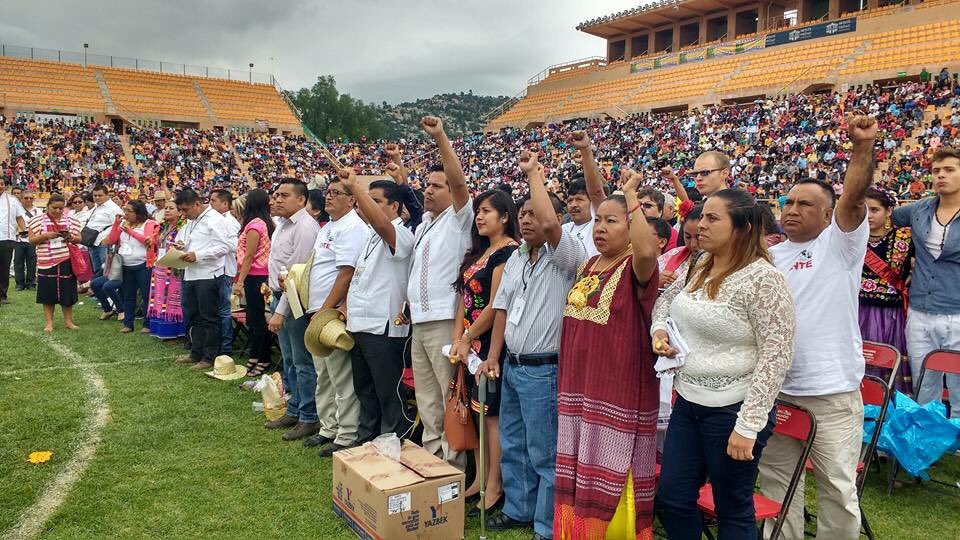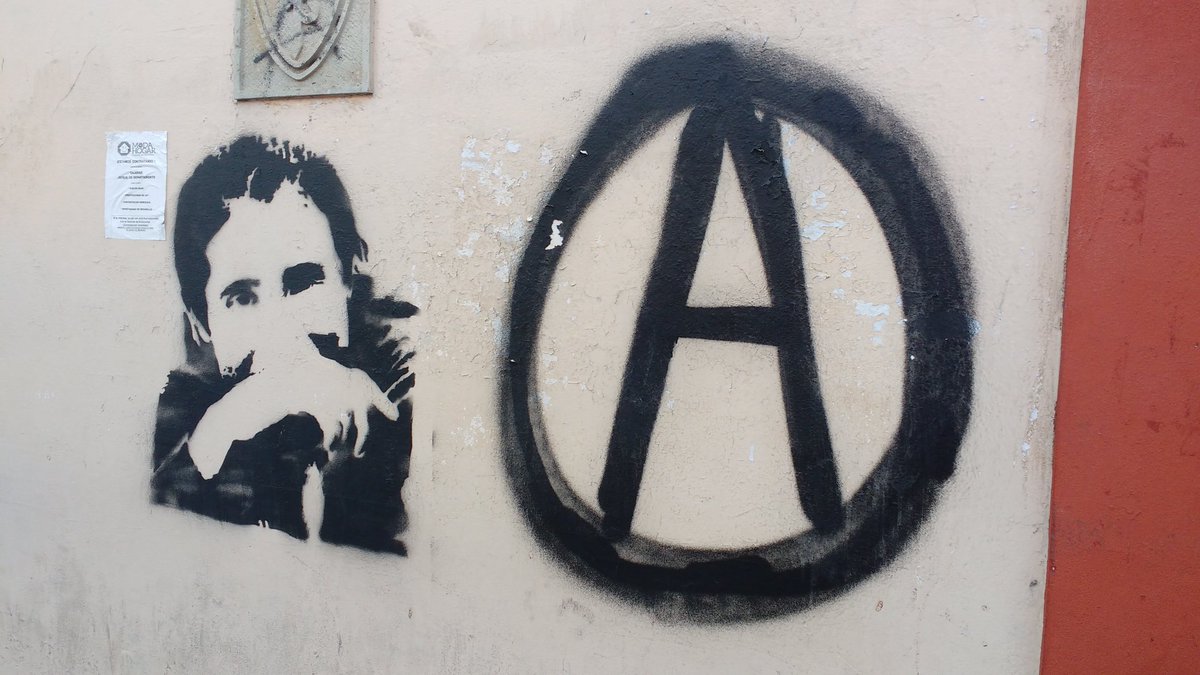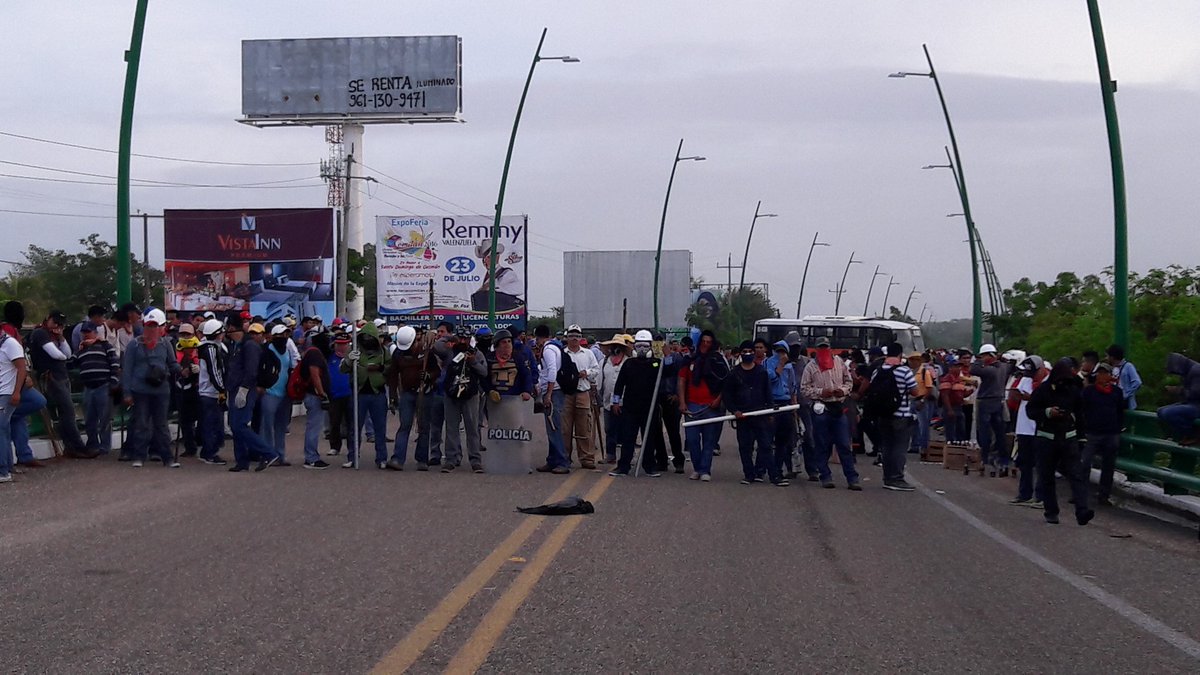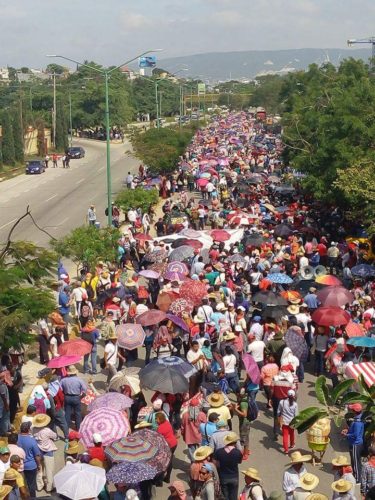Filed under: Editorials, Insumisión, Mexico

Originally posted to It’s Going Down
By Scott Campbell
Next week, teachers in Mexico belonging to the National Coordinator of Education Workers (CNTE) will mark three months on strike. Three months without pay, of sleeping in encampments far from home, of funerals, arrests, disappearances, beatings, fear, uncertainty, and endless hours of marching. Yet the union has remained steadfast in its demand for the repeal of the educational reform and by doing so has created space for a much larger movement to emerge alongside it. What appeared at first as solidarity is increasingly moving toward coherent unity, as the people see their demands reflected in those of the teachers and vice versa. This mutual identification is rooted in an understanding that the forces responsible for creating the innumerable injustices occurring in Mexico can be traced back to neoliberal capitalism as deployed by a corrupt narcostate operating with impunity.
While events in Mexico haven’t been making headlines in the past couple of weeks, the struggle is still on. Along with mobilizing effective displays of its vitality, the movement has been using the decline in repression after the Nochixtlán massacre and the ongoing negotiations with the government to build sturdier foundations for the inevitable confrontations that lie ahead – be they during this phase of resistance or ones that will follow.
Teachers have been particularly active in Chiapas, where on July 25 and August 1, they blockaded access to the international airport in Tuxtla Gutiérrez and during the last four days of July, blockaded the three major shopping malls in that city. They followed those actions up by blockading Torre Chiapas, a skyscraper housing private and government offices in the state capital, on August 2.
Numerous Chiapan civil society groups and networks primarily organized around human rights and territorial defense issued a statement on July 25 announcing their support and unity with the teachers’ movement. And three days later the Democratic State Committee of Parents in Chiapas warned that if the educational reform is not repealed, the school year will not start. They also said they were sending a commission to Nochixtlán to participate in the National Gathering of Parents in Defense of Education and Against Structural Reforms, stating, “we’re going to structure ourselves, above all, to map a path of action to throw out all these reforms and we will walk not just with the teachers, but also with the farmers, the workers, the doctors, the transportation workers, the churches.”
In Oaxaca, the Solidarity Caravan for Freedom and Autonomy, comprised of students from several Mexico City universities and the Supreme Indigenous Council from Xochicuautla, which fought back against significant state repression earlier this year, arrived in Juchitán on July 23 to help out on the barricade and deliver supplies.
As well, the Municipal and Agrarian Authorities Front of Oaxaca held a gathering and decided to build an encampment in front of the old state capitol building in the city of Oaxaca to demand justice for Nochixtlán, the repeal of 12 structural reforms, and freedom for political prisoners. The 97 authorities, seven parents groups, and 19 organizations also agreed to hold a megamarch on August 13, regional assemblies to unite the movement on August 20, create committees to defend education and health care in their communities, visit community radio stations to spread information about structural reforms, and build a union of communities and communal landholders to strengthen territorial defense.
There were large marches in Oaxaca on July 28 and on August 1, when women held a march to mark ten years since a similar march led to the takeover of the state TV station, which was held for the duration of the 2006 uprising and run by women’s collectives.
[Manifestación]
En #Oaxaca realizan marcha masiva magisterial popular #NoAlaReformaEducativa pic.twitter.com/DTVREkaHFP— RadioZapote (@RadioZapote) July 28, 2016
#Oaxaca Mujeres realizan mitín frente a las viejas instalaciones de #CORTV pic.twitter.com/9u4ITaem7y
— Oaxaca Libre (@oaxacalibre) August 1, 2016
Also on August 1, the CNTE got up early and installed barricades blocking access to the Cerro del Fortín, the site of the government-run Guelaguetza. As a result, the state-appropriated cultural festival happened in front of a largely empty auditorium.
Comienza el bloqueo al cerro del fortín por el lado del monumento a la madre por parte de la @Seccion22Cencos pic.twitter.com/MTGdcFPxKR
— Proyecto Ambulante (@proamboax) August 1, 2016
El boicot a la Guelaguetza Oficial es un hecho pic.twitter.com/uKlrAerH8v
— Proyecto Ambulante (@proamboax) August 1, 2016
In Mexico City, 70 people traveled from Nochixtlán to hold a press conference at the monument to the 1968 Tlatelolco Massacre on July 25. They denounced that after all this time and despite three meetings with the federal government, the more than 150 wounded have not been provided access to adequate medical care. And in a symbolic victory, on July 28, the teachers finally made it into the Zócalo in Mexico City for the first time in more than a year. Instead of marching towards the Zócalo en masse only to be blocked by police before arriving, they carried out “Operation Ant,” sending people in a few at a time until there were hundreds of them there.
[Al momnento] #CNTE junto con padres de familia da una vuelta al Zócalo de la ciudad de México #HastaLaVictoriaCNTE pic.twitter.com/O5dUKBzhV7
— RadioZapote (@RadioZapote) July 28, 2016
Elsewhere in Mexico, July 29 saw a teachers march in typically quiet Tlaxcala and on August 3, state police attacked demonstrating teachers in Zacatecas, beating, batoning and tasing them.
The actions are clearly having an impact. On August 3, major business associations held a press conference urging the government to take the “difficult actions” necessary against the “impunity” of the CNTE and claiming they will take legal action against the union for “human rights violations.” They also hinted at halting payments to the government’s health care and housing programs. On August 8, with no appreciation for irony, business owners in Oaxaca attempted to hold a strike to demand the use of government force against those on strike. Solidarity among capitalists didn’t materialize and most businesses remained open.
On the same day as the press conference, teachers in Tuxtla Gutiérrez, Chiapas held a huge march and replied that, “They’re wrong when they stupidly have a press conference and talk about the damage the teachers have done. Those who have done harm to the Mexican people and who have brought misery, exploitation and subjugation are these rapacious business groups behind the so-called educational reform.”
Meanwhile, negotiations between the state and the CNTE continue. Following a July 27 meeting, the CNTE communicated that the Interior Ministry actually agreed to a few items, including reaching out to the legislature to identify a way to repeal the educational reform, to release political prisoners, to pay teachers their withheld salaries, and to rehire teachers fired for disobeying the reform. On August 11, the CNTE’s negotiating team will be meeting with representatives from all political parties in the Mexican Congress to propose a legislative path to repealing the reform. Where all this will lead and whether or not the government will keep its word remains to be seen.
To demonstrate the careful line the CNTE must walk, following the relative success of the July 27 meeting, it was rumored that the union may remove its barricade in Juchitán, Oaxaca. In response, parents and the Popular Assembly of the Juchitecan People organized a march urging the CNTE not to do so.
Lastly, the CNTE is organizing a National Forum Toward the Creation of a Democratic Education Project on August 9 in Mexico City to build proposals with input from a variety of sectors of civil society as to what a holistic and democratic educational program would look like. And beginning on August 18 and running through November, Okupa Che is hosting a series of weekly seminars and workshops examining “Education in Our Neighborhoods”
SEMINARIO Educación en nuestros Barrios. Jueves 16hr (desde el 18 agosto) Foro José Revueltas-Aud. Che Guevara UNAM pic.twitter.com/BI8zIlcmbT
— Regeneración Radio (@regeneracion_r) August 7, 2016
As always, there is much going on in Mexico outside of the popular and teachers’ mobilizations around neoliberal reforms.
July 26 marked 22 months since the students from Ayotzinapa were disappeared. There was a march in Mexico City and in Jalisco demonstrators took over three toll plazas in the state, allowing cars to pass for free. On July 29, the Inter-American Human Rights Commission approved a new mechanism for monitoring the Ayotzinapa case, following the withdrawal of its previous efforts due to harassment and non-cooperation from the Mexican state. Both the parents of the Ayotzinapa students and the Mexican government have signed on to the mechanism.
Llegando los familiares de normalistas al #antimonumento #Ayotzinapa22Meses #PaseDeLista1Al43 pic.twitter.com/sjTaRUSdn7
— Regeneración Radio (@regeneracion_r) July 26, 2016
En el levantamiento de las plumas de la caseta de cobro de Zapotlanejo. #Jalisco #docentes #Ayotzinapa22Meses pic.twitter.com/gRzjWafKx1
— Regeneración Radio (@regeneracion_r) July 26, 2016
In some good news from Atenco, it was announced on July 27 that the highway being built for the new international airport for Mexico City has been definitively suspended. The communities of Atenco had mobilized against the construction of the highway, burning or appropriating the construction materials, which led to the army and paramilitaries escorting in construction workers, occasionally attacking residents.
On August 7, the Callejón de San Ignacio in Mexico City was taken over for the day and night for a series of cultural performances hosting a variety of relatively well-known artists. The theme was Building the Commons.
Caiganle al Callejón d san Ignacio evento cultural itinerante esfuerzo de artistas solidarios #ConstrucciónDeLoComún pic.twitter.com/3xk0B82nJ6
— RadioZapote (@RadioZapote) August 7, 2016
Community spaces have come under attack in Mexico City. Radio Zapote, a community radio station on the grounds of the National School of Anthropology and History (ENAH) first had the administration try to break in using a locksmith and then cut the electricity to their offices.
El hostigamiento hacía radio zapote no cesa por parte de la directora d la #ENAH Julieta Valle hoy nos quito la luz pic.twitter.com/SjCpTpCM1g
— RadioZapote (@RadioZapote) August 5, 2016
And on July 31, six members of Okupa Che, an occupied auditorium on the campus of the National Autonomous University of Mexico (UNAM), were severely beaten by campus security, with five requiring hospitalization, and then arrested. Fortunately, the compas were released on August 2, though one of them was deported to Chile. They have been given 15 days to pay UNAM 40,000 pesos for damage UNAM says happened to three of their vehicles, or else they will face charges.
The eight teacher training schools in Michoacán (normales) have been holding down a barricade for a month in the state, taking 116 vehicles during that time to protest the fact that upon graduation the government refuses to hire them. The Mexican state hates normales because they train rural and working class students to teach in rural and working class areas, complete with a political analysis as to the conditions of their marginalization. Recently, former president Vicente Fox said in an interview that, along with Felipe Calderón making him vomit, when he became president he was told that some normales are nothing more than Trotskyist guerrilla training centers. The Trotskyist part might be true in some cases, but that’s about it.
The cold world of numbers revealed in a series of reports over the past two weeks helps demonstrate just why social revolt is spreading so rapidly. An Oxfam report states that 54.4 percent of Mexicans live in “poverty,” with two million joining that category under Enrique Peña Nieto. One percent of the nation owns 39 percent of the wealth, making it one of the 25 most economically unequal countries in the world. Remittances sent by Mexican migrants abroad are the second largest source of the country’s funds. In the first half of 2016, they sent 13.156 billion dollars, an 8.9 percent increase from last year. Through June of this year, 9,615 murders have been reported, an increase of 16 percent from the same time last year. Only 15 percent of the more than 30,000 children who are internal migrants in Mexico have access to education. Sixty percent work in the fields. 13,156 people have been disappeared in Mexico under Peña Nieto, a rate higher than the most violent periods of the “drug war” under Felipe Calderón. On average, a journalist is murdered every 26 days in Mexico, a fact leading the two main journalist associations to come together and in a cry of “¡¡¡YA BASTA!!!” demand an end to the murders. July 31 was the one year anniversary of the Colonia Navarte massacre in Mexico City, when journalist Rubén Espinosa, activist Nadia Vera, and visitors and housemates Yesenia Quiróz, Olivia Alejandra Negrete, and Mile Virginia were executed, likely under the orders of the Veracruz government. Nadia Vera’s mother issued a powerful text on the eve of that commemoration. Speaking of Veracruz, which under Governor Javier Duarte has seen the murder of 17 journalists, a report came out that Duarte annually earns 1,372,744 pesos more than allowed by law.

Graffiti in Oaxaca commemorating Salvador Olmos, anarchist and community journalist, murdered by police in Huajuapan.
A few more pieces of news. Five hundred miners in Tamaulipas have gone on strike as of July 27 due to unsafe working conditions and worker injuries. The Zapatista-initiated CompArte Festival for Humanity began and is still going on. There are a series of statements pertaining to that on Enlace Zapatista. The autonomous Chol community of Ejido Tila and the National Indigenous Congress are denouncing an incursion into its territory in Chiapas by Marines. A total of 12 events are being held this month in Mexico City to commemorate Black August and mark the release of the book “Agosto Negro: Presos Politicos en Pie de Lucha,” the first book in Spanish to document the Black liberation struggle in the US and its political prisoners. It’s Going Down has translated a couple of recent anarchist texts from Mexico, one examining Telmex’s involvement in the construction of prisons and the acts of sabotage against it. The second is a reflection piece by former members of the Autonomous Cells of Immediate Revolution – Praxedis G. Guerrero, an informal grouping that for five years carried out primarily explosive attacks in and around Mexico City.







